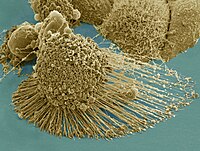
Photo from wikipedia
Discrete dynamical modeling shows promise in prioritizing drug combinations for screening efforts by reducing the experimental workload inherent to the vast numbers of possible drug combinations. We have investigated approaches… Click to show full abstract
Discrete dynamical modeling shows promise in prioritizing drug combinations for screening efforts by reducing the experimental workload inherent to the vast numbers of possible drug combinations. We have investigated approaches to predict combination responses across different cancer cell lines using logic models generated from one generic prior-knowledge network representing 144 nodes covering major cancer signaling pathways. Cell-line specific models were configured to agree with baseline activity data from each unperturbed cell line. Testing against experimental data demonstrated a high number of true positive and true negative predictions, including also cell-specific responses. We demonstrate the possible enhancement of predictive capability of models by curation of literature knowledge further detailing subtle biologically founded signaling mechanisms in the model topology. In silico model analysis pinpointed a subset of network nodes highly influencing model predictions. Our results indicate that the performance of logic models can be improved by focusing on high-influence node protein activity data for model configuration and that these nodes accommodate high information flow in the regulatory network.
Journal Title: Frontiers in Physiology
Year Published: 2020
Link to full text (if available)
Share on Social Media: Sign Up to like & get
recommendations!